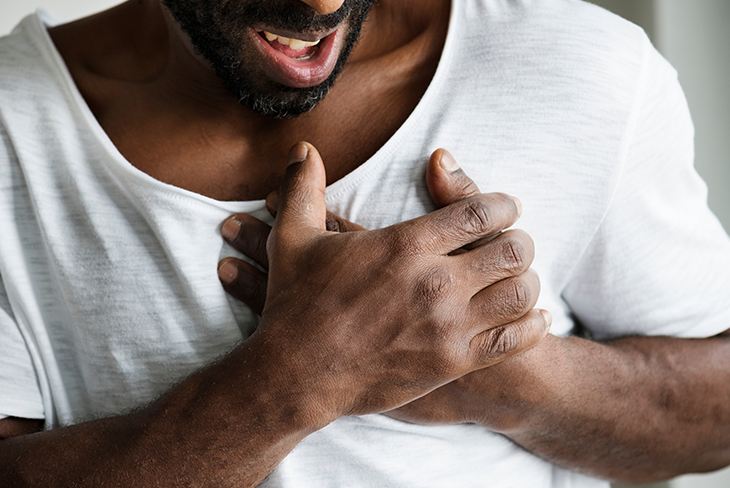What’s causing my chest pain?

Chest pain causes can range from serious to harmless, but how can you tell the difference? Our expert weighs in on five of the most common types.
1. Heart attack
Causes
Cholesterol-laden plaque (called atherosclerosis) causes narrowing of coronary arteries and heart attacks occur when one or more plaques rupture, leading to blood-clot formation and sudden artery blockage.
Symptoms
An unexpected squeezing or burning pain in the middle of the chest, which can spread up to the neck and/or arms and is often accompanied by a feeling of impending doom, nausea and sweating. There can be variations to this pain, particularly in women and diabetics.
Treatment
Electrical tracings of the heart rhythm and blood tests will be done to make the diagnosis. Treatment may consist of medication to dissolve the blood clot in the coronary arteries and/or an angiogram will be performed, after which a coronary stent (small tube) can be implanted, if necessary. Modifiable risk factors (such as blood pressure, cholesterol, diabetes and lifestyle choices) must also be monitored and treated with medication and lifestyle interventions.
Prevention
Leading a healthy lifestyle and treating risk factors for atherosclerosis, which includes maintaining a healthy weight; avoiding smoking; following a healthy diet (such as the Mediterranean diet); getting quality sleep; reducing stress and keeping blood pressure normal; and cholesterol and diabetes screenings and treatment.
2. Angina
Causes
Stable angina (the most common form of angina) is caused by atherosclerosis, leading to insufficient blood getting to the heart muscle when there is an increased need, but resolves with rest.
Symptoms
A dull, squeezing or burning pain in the middle of the chest that may spread up to the neck and/or arm, usually precipitated by physical effort or emotion and subsiding with rest.
Treatment
Medication, and further investigations that may include an angiogram with possible implantation of coronary stents, if indicated. Some patients may require coronary bypass surgery. Modifiable risk factors must also be monitored regularly and treated with medication and lifestyle interventions.
Prevention
Leading a healthy lifestyle and treating risk factors for atherosclerosis.
3. Muscle strain
Causes
Stretching or tearing of chest muscle fibres as a result of sports injuries, poor posture, falling, a severe cough or overuse of muscles.
Symptoms
Depending on the severity, injured chest-wall muscles may lead to sharp pain in the chest or dull pain, swelling, muscle spasms, difficulty moving the area, bruising and pain while breathing.
Treatment
Rest from physical activity, applying ice, anti-inflammatory drugs, stronger analgesics or muscle relaxants. Physiotherapy or even surgery to repair torn muscle may also be recommended.
Prevention
Warming up and cooling down before and after exercise, proper posture, strengthening core muscles, avoiding excessive exercise and using correct training techniques.
4. Infection
Causes
A result of viral, bacterial or, occasionally, fungal infections, which affect the lung’s larger airway (bronchitis) or the smaller air sacs lower down in the lungs (pneumonia).
Symptoms
A chesty cough (with green or brown phlegm), breathing difficulties, sharp pain in chest or tightness, high temperature, headache, muscle aches and pains, fatigue and rapid heartbeat.
Treatment
Bacterial chest infections are treated with antibiotics, but viral infections generally clear on their own and may only require symptomatic treatment. Hospital admission may be required for severe infection, but taking medications as directed, drinking fluids, resting, using a humidifier or steaming, elevating the head while sleeping and avoiding smoking generally ease symptoms.
Prevention
Frequent hand washing, disposing of used tissues, avoiding smoking, and getting flu and pneumococcal vaccines.
5. Indigestion
Causes
Ulcers, acid reflux, stomach infections, irritable bowel syndrome, pancreatitis (an inflamed pancreas), pregnancy hormones, certain diseases or medications, and lifestyle choices such as eating too much or too quickly, drinking excessive alcohol, smoking, stress and fatigue.
Symptoms
Heartburn, an acidic taste, bloating, fullness during or after a meal, stomach growling, belly pain, burning in the stomach or upper belly, belching, gas, nausea or vomiting.
Treatment
Antacid medications or other treatment options may be prescribed, such as proton pump inhibitors, prokinetics, antibiotics, antidepressants or anti-anxiety medications, depending on the specific diagnosis.
Prevention
Avoiding trigger foods, regularly eating smaller meals, reducing or eliminating alcohol and caffeine consumption, avoiding certain pain relievers (such as aspirin and ibuprofen) and controlling stress and anxiety.
A note from our expert
‘I would definitely recommend that any person suffering from recurrent or persistent troubling chest pain visit their doctor for a proper assessment,’ advises Dr Brad Griffiths, cardiologist at Life Vincent Pallotti Hospital in Cape Town. ‘And especially in the case of a heart attack, as time is muscle (i.e. the longer you take to get treatment for a heart attack, the more heart muscle you lose).’
The information is shared on condition that readers will make their own determination, including seeking advice from a healthcare professional. E&OE. Life Healthcare Group Ltd does not accept any responsibility for any loss or damage suffered by the reader as a result of the information provided.

